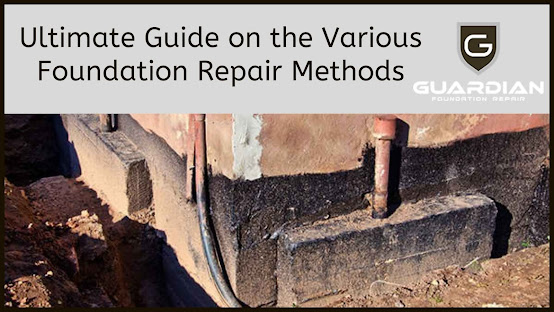Ultimate Guide on the Various Foundation Repair Methods
Informality with the procedure of foundation repair is helpful for multiple reasons. First, when you own a home, you want to make sure the foundation is in good shape. Second, if your home's base needs a repair, you will want to make an informed decision on how best to fix it.
Following are the various foundation repair methods proven to be the best and reliable ones. So that you can choose accordingly which methods support your home better.
What causes foundation damage?
Water is often the obvious reason for foundation damage. Fluctuations start happening in the
foundation of a structure when the soil components begin to swell due to moisture. In addition, damage
may take place when the area around the foundation has no proper sewerage facilities.
When there is plumbing, exclude below the structure by earthquakes, floods, or drought. This also leads
to foundation damage. Likewise, when the soil is high in clay content. This may also cause foundation
damage.
The outturns of foundation destruction
Foundation vandalism is a serious issue and has several outcomes like damage to infrastructure, loss of
value in real estate context, malfunctions of the equipment, etc. In addition, the foundation damage can
also make a home highly unsafe for accommodation.
The symptoms of foundation damage
Cracked bricks
Cracked foundation
Cracked walls
Cracked floors
Uneven floors
Bulging floors
Sticking doors
Several methods of foundation repair
Basement foundation
A full foundation begins with a hole of at least eight feet deep to accommodate an underground living
space whose floor area meets most or all of the ground level. The great advantage of the basement
foundation is the extra living space it can offer. In fact, it can double the home's square footage if
homeowners choose to finish it.
The basement foundations are long lasting and resistant to fire and extreme weather. However, a
basement foundation is the most costly foundation. In addition, it is not recommended to build a
basement if you live in an area with flooding risks. Basement Systems have pioneered the field of crawl
space encapsulation and how it works and benefits the homeowners.
Crawl space foundation
Short foundation walls on concrete footings form the base of houses with crawl spaces. They include the
space exactly as it sounds: A slightly elevated space below a house through which you can crawl and
offers enough room for storage, furnace. And other equipment.
Our experts from Guardian Foundation Repairs install the niche crawl space repair products to modify any issue crawl space into a clean and dry base with an asset rather than the liability.
A main and practical benefit of a crawl space foundation is the protection of the home. By hoisting the
base of the house, its walls are safeguarded from flooding and other natural hazards. In addition, the
space allows easy access to plumbing, wiring, and other mechanical systems. And elevating the base of
the house lifts the entire home, resulting in an aesthetically gratifying house.
It is also a less costly alternative than digging a full basement.
Concrete slab foundations
A slab base , sometimes denoted as a mono slab foundation, is a smooth concrete slab that rests on the
ground and cascades into a single piece. The main advantage of the mono slab foundation is that they
are less costly and faster to construct.
With that, the installation is an easy process. A concrete embedded beam runs about two feet deep
around the slab's perimeter wire mesh, and steel fortifying bars are embedded in the concrete.
Since buildings that sit on a slab don't have crawl spaces, homeowners won't have to worry about the
maintenance issues crawl spaces can present.
Push pier system
Push piers systems are usually installed outside, where the soil is excavated to access foundation
footing. Still, they can be installed inside where a small basement floor area will be cut out. They're
harboured with pier brackets that enlarges under the whole foundation wall, shifting weight onto the
push pier and grasping its push into the ground.
Wrapping it up,
The most tough choices you will make when building a house is dictating the sort of base it will rest on. Get the best and suitable foundation repair with the help of a foundation repair method that suits you the best.



Comments
Post a Comment